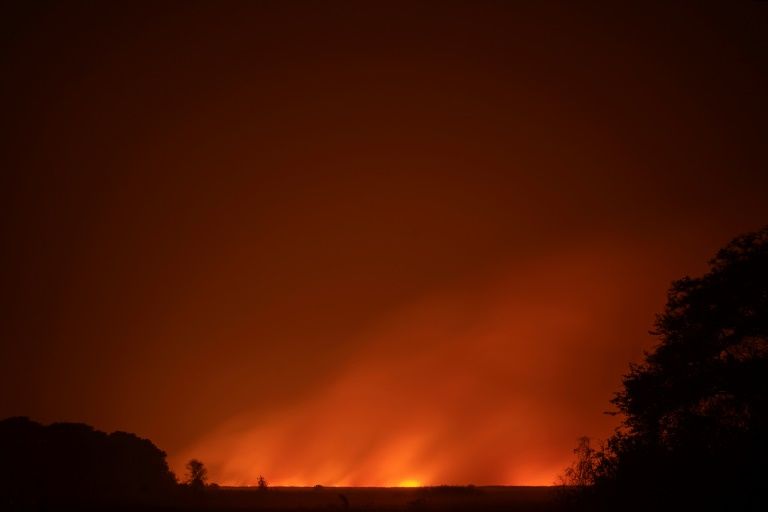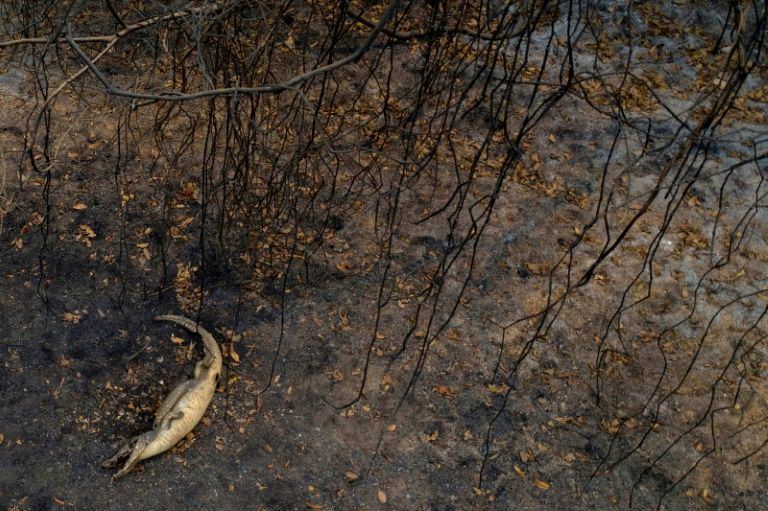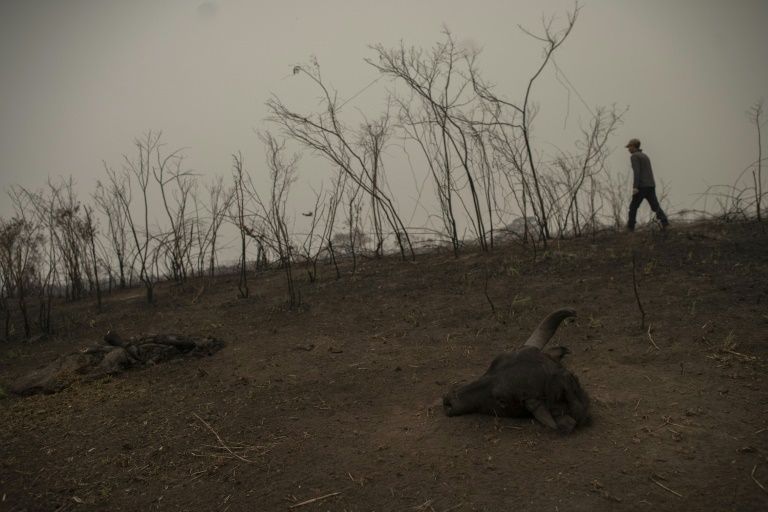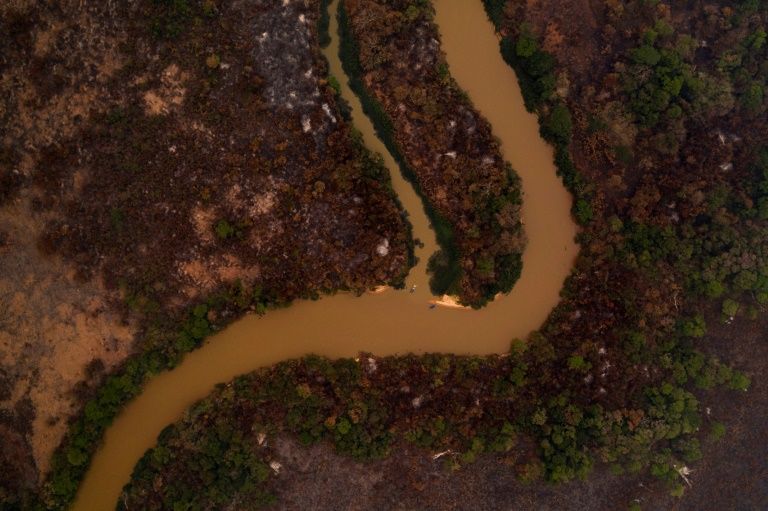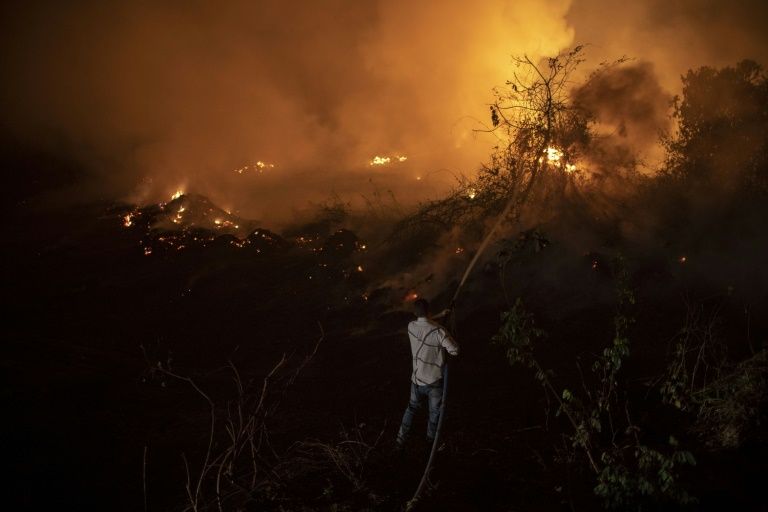The smell of burnt vegetation and the red glow of flames welcome visitors these days to the Pantanal, the world's biggest tropical wetlands -- a biodiverse paradise that is now partly reduced to ashes by record wildfires.
In the northern Pantanal, in central-western Brazil -- a region that formerly had a thriving ecotourism industry -- hotel employee Felipe Maia is hosing down a wooden bridge, hoping to stop the nearby flames from igniting it.
There are scores of wooden bridges like this over the streams criss-crossing the wetlands along the dirt highway across the Pantanal, the 150-kilometer (95-mile) "Transpantaneira."
But amid the region's worst drought in 47 years, many streams have run dry, and the fires often set this time of year on farms and ranches to clear land have spiralled out of control.
"Every day we drive along the road, check which bridge is closest to catching fire and douse it in water," Maia told AFP after soaking the bridge, just meters (yards) from the flames.
The Pantanal sits at the southern edge of the Amazon rainforest, stretching from Brazil into Bolivia and Paraguay.
In normal times, it draws tourists from around the world with its lush landscapes and wildlife, including jaguars, jabiru storks, giant otters, caimans, toucans, macaws and monkeys.
|
|
| A dead alligator lies beside the Transpantaneira park road in the Pantanal wetlands in Mato Grosso state, Brazil, on September 14, 2020. Photo: AFP |
But this year, around 23,500 square kilometers (9,000 square miles) of the wetlands have gone up in smoke -- nearly 12 percent of the Pantanal.
There have been a record-shattering 14,764 fires in the Brazilian Pantanal this year, according to satellite data from Brazil's National Space Research Institute (INPE).
In less than nine months, 2020 has already broken the annual record for the number of fires, according to INPE, with an increase of 214 percent from the same period last year.
"It's sad. Just when we thought tourism was about to bounce back from the coronavirus pandemic, these fires have destroyed 10 to 15 percent of the Pantanal," said tour guide Roberto Carvalho Macedo, part of an informal brigade of firefighters, local residents, officials and hotel owners who have banded together to patrol the area's bridges day and night.
|
|
| Tour guide Roberto Carvalho, 50, walks beside a buffalo carcass found inside a burnt area, while searching for signs of an injured jaguar at the wetland of Pantanal, Transpantaneira park road in Mato Grosso state, Brazil, on September 13, 2020. Photo: AFP |
Animals in 'critical condition'
Fellow guide Eduarda Fernandes Amaral was traveling by boat up a river in Encontro das Aguas State Park, known as the home to the world's biggest jaguar population.
She and a team of veterinarians and biologists were looking amid the charred remains of trees and shrubs for a jaguar that had reportedly been wounded in a fire.
"All the animals we've rescued so far have been in critical condition. Some of them have died, some are burnt all the way to the bone," she said.
She set out drinking water and baskets of fruit for animals that survived the fires. They now risk dying of dehydration or starvation.
It is impossible to estimate yet how many animals have died, but she said she fears the losses are enormous.
"I hope this makes people open their eyes and understand that the biodiversity here is unique. We have to preserve it," she told AFP.
|
|
| An aerial view showing damage from a fire at the wetland of Pantanal at the Transpantaneira park road in Mato Grosso state, Brazil, on September 13, 2020. Photo: AFP |
Causes and effect
The scenes in the Pantanal are reminiscent of the wildfires devastating the US West Coast.
As with those fires, there is a complex web of factors driving the blazes.
The main cause in the Pantanal is drought.
From January to May, the usual rainy season, the region received just half the precipitation it normally does. As a result, many areas that are usually flooded this time of year are dry.
Exacerbating the problem, ranchers are increasingly introducing non-native plants for pasture land, weakening the region's natural resistance to fire, experts say.
|
|
| A volunteer throws water to control a fire using a water tank truck to protect a wooden bridge - one of 119 bridges of the Transpantaneira Park Road - at the wetland of Pantanal at the Transpantaneira park road in Mato Grosso state, Brazil, on September 13, 2020. Photo: AFP |
Ecologists also blame funding and staffing cuts at Brazil's environmental protection agencies under far-right President Jair Bolsonaro, who took office in January 2019.
"There's a widespread sense of impunity" among farmers and ranchers who set fires to clear land for crops and pasture, said forestry engineer Vinicius Silgueiro of the Life Center Institute (ICV).
There have been 62,627 fires in the Brazilian Amazon so far this year, an increase of 10 percent from the same period last year.



